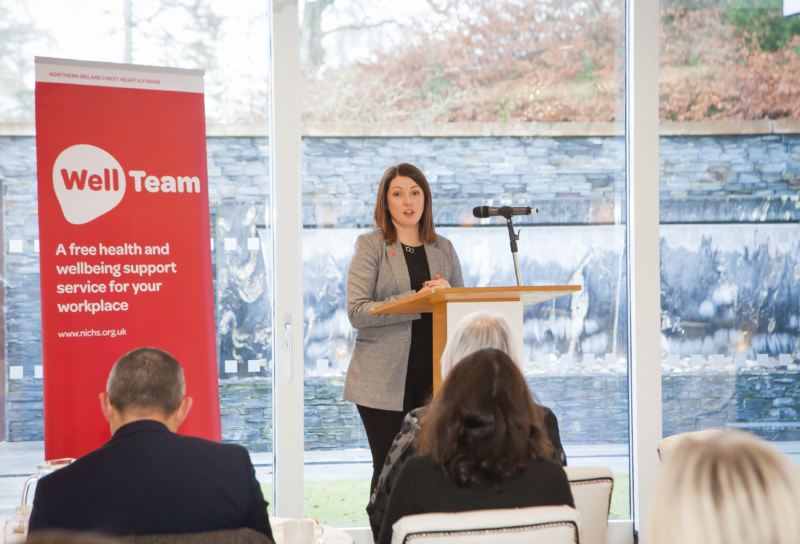COVID-19 has had a huge impact on every aspect of life, not least within the world of work. As a result, looking after employee wellbeing and health has never been more important for organisations across all sectors. We caught up with Emma McCrudden, Programme Manager of our Work Well Live Well programme, which is funded by the PHA, to find out how her team have adapted to support local workplaces through the pandemic.

Can you adapt to deliver workplace health and wellbeing during the current Coronavirus pandemic?
Emma: Yes! It has been a challenge, but one we have all risen too. The Public Health Agency encouraged both the teams at Northern Ireland Chest Heart and Stroke (NICHS) and at Developing Healthy Communities, who provide the programme in the West, to make sure this free workplace health and wellbeing programme would still be available to workplaces across NI during this challenging time.
Alongside ‘Developing Healthy Communities’, we are committed to bringing the same high-quality evidence-based programme to workplaces now when they most need it. All workplaces are experiencing change through furlough, working from home and now returning to the workplace in whatever capacity that may be. This will have a massive impact on the health and wellbeing of employees.
What are some of the ways you’ve had to adapt? Have there been any changes that you’ve found particularly difficult - or a breath of fresh air?
Emma: We’re quite a hands-on programme, and face to face connection was a big part of what we did. Faced with the complete opposite of this, we’ve had to adapt very quickly to this new world. Employee health and wellbeing surveys being hosted online was probably the easiest part - and in reality, we’ve adapted to this quite easily and immediately saw the benefits.
Meetings being held by video conferencing was a shock to the system, but are now the new norm for most of us and one we may continue with in the future too. Reading non-verbal cues which, like it or not, we all use in face to face conversation, initially felt so strange. Not to mention the wacky virtual backgrounds that can take a while to get used to!
What do you think has been the biggest challenge?
Emma: Adapting our health promotion programmes and training to work online has probably been the most challenging thing of all. But we now can offer a range of Wellbeing Webinars focused on health and wellbeing issues online, delivered by our experienced workplace health promotion team. Our training has moved to online and we want to ensure that businesses still have that very much valued networking opportunity with other likeminded workplaces even in the current situation. We certainly have been able to achieve a lot in a short space of time.
Many of the early discussions with clients were about feasibility. But those teething problems have been overcome and although it isn’t right to say we’re back to normal, we’re open for business and ready to carry on delivering the PHA’s funded workplace health and wellbeing programme.
Are there any changes you think you will keep in place even after the pandemic?
Emma: Overall, despite being a challenging time for the programme, a lot of the changes we’ve made to cope with COVID-19 will most likely stay post pandemic.
All aspects of the programme can be delivered remotely, which makes it even more convenient and easy for workplaces to invest in their employee’s health and wellbeing, and I’m sure this will continue to be appealing to many businesses even after the pandemic. The survey to determine an organisation’s health priorities is delivered online and is essential to develop a 3-year action plan that is relevant to employee needs at this time. Health Champion and Mental Health First Aid training can be delivered successfully online and access to 2 free Well Webinars allows viewers to watch and interact while following social distancing advice.
Although face to face contact is temporarily missing, it will easily slot back in once the pandemic has ended.
Work Well, Live Well in practice
Edgewater Contracts in Toome signed up to the NI Chest Heart and Stroke Work Well Live Well programme last year, and after formulating and launching their workplace health and wellbeing action plan in January, never would have thought that we would be in this situation.
Lynsey Graham, HR Manager for Edgewater Contracts said, “We had to adapt our workplace health action plan because of the current pandemic. I was delighted that NICHS could provide us with online webinars and resources to support staff at this time. We chose stress management and physical activity, which reflected our original priorities and is also relevant to staff during this time of change for us all. We had registered employees for Mental Health First Aid as part of the programme and look forward to this being offered online over the coming months.”

